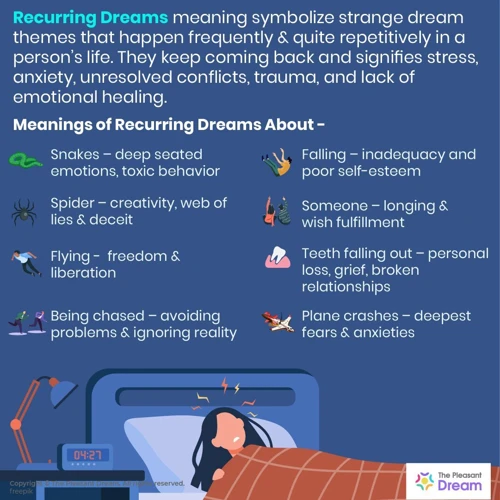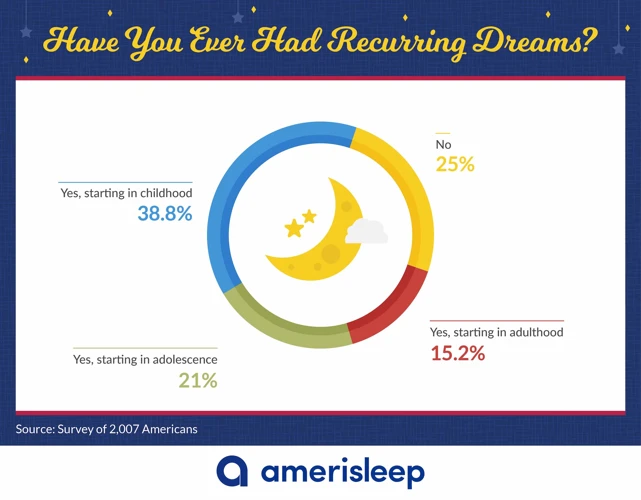Have you ever wondered why certain dreams keep coming back to haunt you, night after night? Recurring dreams can be perplexing, leaving us searching for answers to their hidden meanings. In this article, we will delve into the mystery of recurring dreams and explore the various theories and interpretations behind them. From understanding common themes in these dreams to unraveling their psychological and emotional significance, we will embark on a journey to decode the secrets of our sleeping minds. Prepare to dive deep into the realm of subconscious symbolism and gain a better understanding of what your recurring dreams may be trying to tell you.
Understanding Recurring Dreams

Recurring dreams are enigmatic experiences that captivate our thoughts and emotions. These dreams have a distinctive quality, as they repeat themselves in our slumber, leaving us pondering their significance. To begin unraveling the secrets of recurring dreams, we must first explore what they are and the common themes that often emerge within their narratives. By diving into the realm of recurring dreams, we can gain insight into the hidden messages they may hold and unlock the deeper meanings behind our nocturnal visions.
1. What are Recurring Dreams?
Understanding recurring dreams begins with exploring what they actually are. Recurring dreams are vivid and repetitive dreams that occur over an extended period of time. Unlike ordinary dreams that fade from memory, recurring dreams stick with us, leaving a lasting impression. These dreams often feature familiar settings, characters, or themes, and they reoccur with a frequency that sets them apart from other dreams. They can be puzzling and thought-provoking, as they seem to carry a deeper significance that warrants exploration and interpretation. By recognizing and acknowledging the existence of recurring dreams, we open ourselves up to a world of hidden meanings and symbols.
2. Common Themes in Recurring Dreams
When it comes to recurring dreams, certain themes tend to prevail and repeat themselves across different individuals. These common themes often reflect our fears, anxieties, and unresolved issues. Some recurrent dream themes include falling, being chased, teeth falling out, exam or test scenarios, and even flying. These themes may vary in their symbolism and personal significance, but they provide valuable clues about our subconscious thoughts and emotions. By recognizing and analyzing these recurring themes, we can begin to decode their underlying messages and gain deeper insights into our own psyche.
Exploring the Meaning of Recurring Dreams

To truly understand recurring dreams, it is essential to explore their meaning and the various interpretations they may hold. One perspective is the psychological interpretation, which suggests that recurring dreams reflect unresolved conflicts or emotions within our subconscious minds. These dreams could serve as a means for our psyche to process and confront unresolved issues. Another aspect to consider is the emotional significance of recurring dreams. They often tap into deep emotions, representing our fears, desires, or anxieties. By paying attention to these emotions, we can gain valuable insights into our innermost selves. Additionally, recurring dreams may hold deeper subconscious messages that go beyond surface-level interpretation. These dreams may offer symbolic representations of aspects of our lives or serve as warnings or guidance. By exploring the meaning of recurring dreams through these different lenses, we can begin to unlock the rich symbolism and hidden significance within them.
1. Psychological Interpretations
Psychological interpretations provide valuable insights into the meaning of recurring dreams. These interpretations delve into the workings of our subconscious mind and explore the symbolism within our dreams. Psychologists believe that recurring dreams may reflect unresolved conflicts, fears, or desires that are deeply ingrained in our psyche. They serve as a means for our subconscious to communicate and process these underlying emotions. For example, recurring dreams of being chased may signify a persistent fear or feeling of being pursued. Similarly, dreams of falling could symbolize a lack of control or instability in one’s life. By unraveling the psychological interpretations of recurring dreams, we can gain a better understanding of our inner thoughts and emotions.
2. Emotional Significance
Understanding the emotional significance of recurring dreams is key to deciphering their meanings. These dreams often evoke strong emotions, such as fear, sadness, or joy, which can provide valuable insights into our subconscious thoughts and feelings. Some recurring dreams may be a reflection of unresolved emotional issues or traumas in our waking life, while others might represent unfulfilled desires or aspirations. It is essential to pay attention to the emotions we experience in these dreams, as they serve as important clues for unraveling their deeper significance. Through careful reflection and analysis, we can begin to decipher the emotional messages that our recurring dreams are trying to convey.
3. Deeper Subconscious Messages
When it comes to recurring dreams, one of the most fascinating aspects to explore is the idea of deeper subconscious messages. These dreams often serve as gateways to our innermost thoughts, desires, fears, and unresolved conflicts. They provide a unique window into our subconscious mind, offering insights into aspects of ourselves that may be hidden or overlooked in our waking life. By analyzing the symbols, emotions, and patterns present in recurring dreams, we can uncover these hidden messages and gain a deeper understanding of ourselves and our experiences. Whether it’s a recurring dream of being lost, facing a recurring challenge, or encountering familiar faces, these dreams hold valuable clues that can guide us on our journey of self-discovery. The key is to pay attention, reflect, and interpret these messages with an open mind and a willingness to explore the depths of our subconscious.
Interpreting Specific Types of Recurring Dreams

Interpreting specific types of recurring dreams allows us to delve deeper into the realm of symbolism and meaning. Each dream archetype carries its own unique significance and insights into our subconscious minds. From falling dreams that represent a loss of control to teeth falling out dreams reflecting underlying anxieties, and being chased dreams symbolizing avoidance, these recurrent symbols hold keys to understanding our innermost fears, desires, and unresolved conflicts. Additionally, exam or test dreams may mirror our need for validation or fear of failure, while flying dreams can represent a sense of liberation and transcendence. Exploring these distinct dream types helps us decode the intricate messages shrouded within our recurring dreams.
1. Falling Dreams
Falling dreams are a recurring theme that many individuals experience during their sleep. These dreams often leave us with a sense of unease and vulnerability as we plummet through the air. While the exact meaning of falling dreams can vary from person to person, there are a few common interpretations to consider. Some psychologists suggest that falling dreams may symbolize a lack of control or fear of failure in waking life. Alternatively, these dreams can serve as a metaphor for letting go or surrendering to a situation beyond our control. Regardless of the specific interpretation, falling dreams often evoke intense emotions and prompt us to explore our fears and insecurities.
2. Teeth Falling Out Dreams
Teeth falling out dreams are a recurrent phenomenon that leaves many puzzled and disturbed upon waking. These dreams often involve the sensation of teeth becoming loose, falling out, crumbling, or breaking. While the imagery may vary, the unsettling feeling remains constant. The meaning behind teeth falling out dreams can be interpreted in various ways, drawing upon psychological and symbolic associations. These dreams are commonly associated with feelings of powerlessness, vulnerability, and a fear of losing control. They may also symbolize a lack of confidence, concerns about self-image, or communication issues. By exploring the possible meanings behind teeth falling out dreams, we can gain a better understanding of the messages our subconscious mind may be conveying to us.
3. Being Chased Dreams
Being chased dreams are among the most common recurring dreams experienced by individuals. These dreams evoke a sense of fear, panic, and an urgency to escape from an unknown pursuer or threat. The intensity of these dreams often leads to waking up in a state of anxiety, with a lingering sense of vulnerability. While the exact meaning behind being chased dreams may vary from person to person, they typically symbolize a feeling of being pursued or hunted in waking life. It could indicate unresolved fears, anxieties, or a sense of being overwhelmed by challenges or responsibilities. Exploring the specific details and emotions associated with being chased dreams can help unlock their underlying messages and empower individuals to address and overcome their fears in their waking lives.
4. Exam or Test Dreams
Exam or test dreams are a common type of recurring dream that many people experience. These dreams typically involve scenarios where individuals find themselves unprepared or anxious about an upcoming examination or test. The intensity of these dreams often reflects the individual’s feelings of pressure and self-doubt in their waking life. The content of these dreams may vary, ranging from being unable to find the exam location to forgetting all the answers. Exam or test dreams may stem from a fear of failure or a lack of confidence in one’s abilities. They may also represent a subconscious desire for validation or a need to prove oneself. By exploring the underlying emotions and triggers associated with exam or test dreams, we can gain a better understanding of our own insecurities and anxieties.
5. Flying Dreams
Flying dreams are a recurring theme that often leaves us with a sense of awe and wonder. In these dreams, we find ourselves soaring through the sky, weightless and unrestricted by the limitations of the physical world. The act of flying symbolizes freedom, liberation, and a sense of empowerment. It signifies a release from the constraints and pressures of daily life. Flying dreams can also represent a desire for independence, the ability to rise above challenges, or a longing for escape. While each individual’s flying dream may have its unique nuances, these dreams often embody a sense of exhilaration and possibility, inviting us to explore the depths of our imagination and embrace the boundless potential within ourselves.
Unraveling the Causes of Recurring Dreams
Unraveling the causes of recurring dreams requires a closer look at the factors that may contribute to their occurrence. One possible cause is unresolved issues or trauma that our subconscious mind seeks to process. These dreams can serve as a way for our psyche to confront and work through unresolved emotions or experiences. Another contributing factor to recurring dreams is anxiety and stress. When we are under immense pressure, our dreams may manifest in repetitive patterns as a reflection of our anxious thoughts. By examining these potential causes, we can gain a deeper understanding of why recurring dreams occur and potentially find ways to address and alleviate their frequency.
1. Unresolved Issues or Trauma
Unresolved issues or trauma can play a significant role in the occurrence of recurring dreams. These dreams often serve as a way for our subconscious to process and confront unresolved emotions or past traumatic experiences. The repetitive nature of these dreams may indicate that there are unresolved conflicts or unresolved emotions that need our attention. It could be a sign that we have unfinished business in our waking lives that needs to be addressed. By acknowledging and addressing these underlying issues, we may find relief from the repetitive nature of these dreams and experience a sense of healing and closure.
2. Anxiety and Stress
Anxiety and stress can play a significant role in the occurrence of recurring dreams. When we experience high levels of stress or anxiety in our waking lives, it can manifest in our dreams as well. These dreams often reflect our fears, worries, and insecurities, creating a feedback loop between our conscious and unconscious minds. Symptoms of anxiety such as racing thoughts, restlessness, and a general sense of unease can seep into our dreams, giving rise to recurring themes. In these dreams, we may find ourselves being chased, unable to escape a certain situation, or facing intense pressure and scrutiny. These dreams serve as a reflection of our inner turmoil and can provide valuable insight into the sources of our stress and anxiety. By acknowledging and addressing these underlying issues, we can work towards reducing the frequency and intensity of recurring dreams caused by anxiety and stress.
Conclusion
In conclusion, recurring dreams remain a captivating mystery that continues to intrigue researchers and individuals alike. These dreams often contain hidden messages and symbolism that can provide valuable insights into our subconscious thoughts and emotions. By exploring the psychological interpretations, emotional significance, and deeper subconscious messages within recurring dreams, we can gain a deeper understanding of ourselves and our unresolved issues. Additionally, by examining specific types of recurring dreams such as falling dreams, teeth falling out dreams, being chased dreams, exam or test dreams, and flying dreams, we can further decode their meanings. Ultimately, the causes of recurring dreams may stem from unresolved issues or trauma as well as anxiety and stress. As we delve into the depths of our recurring dreams, we journey into the realm of our subconscious mind, unlocking a world of symbolism and self-discovery.
Frequently Asked Questions
1. What causes recurring dreams?
Recurring dreams can have various causes, including unresolved issues or trauma, anxiety, stress, or even certain medications. They often stem from the subconscious mind’s attempt to process emotions or experiences.
2. Are recurring dreams common?
Yes, recurring dreams are relatively common. Many individuals report having recurring dreams throughout their lives, with some dreams persisting for months or even years.
3. Can recurring dreams have different meanings for different people?
Absolutely! The meanings of recurring dreams can vary greatly from person to person. A dream’s significance is deeply personal and can be influenced by an individual’s unique experiences, emotions, and subconscious associations.
4. Are there any common themes in recurring dreams?
Yes, several common themes often emerge in recurring dreams. Some examples include falling, teeth falling out, being chased, or being unprepared for an exam or test.
5. Can recurring dreams be interpreted in a general way?
While recurring dreams may share common themes, it is essential to approach their interpretation on an individual basis. Symbolism in dreams can vary, and it’s crucial to consider personal context and associations when deciphering their meanings.
6. Do recurring dreams always have a deeper meaning?
Not necessarily. While recurring dreams can carry profound significance, they can also be a reflection of repetitive thoughts, memories, or daily routines. It’s important to explore potential meanings but also to consider the possibility of surface-level interpretations.
7. Can recurring dreams be a sign of unresolved trauma?
Yes, recurring dreams can sometimes be an indication of unresolved trauma or emotional issues. They may serve as a way for the subconscious mind to process and heal from past experiences.
8. Are recurring dreams more vivid than regular dreams?
Recurring dreams can often feel more vivid or intense compared to regular dreams. The continued repetition of a dream can enhance the dreamer’s awareness and emotional engagement with the dream’s content.
9. Can recurring dreams be influenced by daily life experiences?
Absolutely! Recurring dreams can often be influenced by the dreamer’s daily life experiences, thoughts, and emotions. They may serve as a reflection or response to ongoing events or challenges.
10. Can analyzing recurring dreams help with personal growth and self-discovery?
Yes, analyzing recurring dreams can be a valuable tool for personal growth and self-discovery. By exploring the symbols and emotions within these dreams, individuals can gain insight into their subconscious thoughts, desires, and fears, ultimately fostering self-awareness and personal development.

